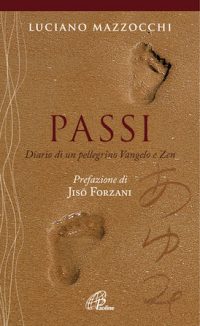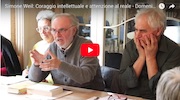* 5. “Rising from the cushion like a Bodhisattva!”
Prayer before the Sacrament of the Body of Christ should keep us united with him, prolonging, so to say, that sacramental union, communion, which is the culminating point of the Lord’s Supper, the Mass. Through prayer, meditation, adoration, and especially silent sitting (zazen) before the Tabernacle, the disciples of Rabbi Jesus continue, or renew, their communion with his self-giving, his sacrifice, his death-and-resurrection. Just as at the end of the Mass they are sent to announce what they have seen and experienced, and to carry out in their daily life the mystery they have celebrated, likewise, rising from their prayer before the Blessed Sacrament they should return to their place of work, their life in the family, in society, to live there communion with Christ they have experienced and deepened during prayer.
In the Zen tradition there is an expression that sounds like: “… after sitting, stand up from your cushion with the heart of a bodhisattva”! The bodhisattva (bosatsu in Japanese) is the Buddhist symbol for the infinite mercy of the Buddha, his will to save alI sentient beings. The most commonly known bodhisattva is Amithāba or Amitāiyus (in Japanese: Amida), who upon becoming a Buddha and attaining the infinite powers of Buddha vowed never to enter the perfect state of Nirvana until all sentient beings were saved. This concern and love for all human beings, indeed for all of creation, is for a Christian a beautiful symbol of the love of God revealed and given to us in Christ.
Once again, here, Christians should rejoice in finding semina Verbi, a revelation of God’s plan for the salvation of the world, in the Buddhist tradition.
As a matter of fact the reference to Amida is not proper to Zen Buddhism. The Buddhist school making Amida and its vow to save alI sentient beings the center of its doctrine and its religious tradition is the Jōdo (Pure Land) school. A particular and somehow extreme form of it is the Jōdo Shinshii (or True Religion of the Pure Land) of Shinran. In common Buddhist practice, however, we often find elements of different traditions mingling.
One reproach which sometimes is made of Buddhism in general and of Zen Buddhism in particular, is that it seems to be (and historically it has often been) more concerned with one’s own salvation than with the salvation of others, service to society, or social involvement. Often Buddhists admit that they look to Christians for inspiration in this regard.
If the practice of zazen on the part of Christians could be a way to dialogue and exchange of spiritual experiences with Buddhists, especially Buddhists of the Zen school,12 to Zen Buddhists the Christian way to enlightenment, the way of Christ to emptiness and total communion with Absolute Reality, which He revealed as Absolute, Living, Personal, Lave.
In other words, Christians who could ‘sit’ and then stand up with the heart of Christ, would be capable of conveying the Christian message to Zen Buddhists with particular efficacy.
Far dialogue implies mutual witness, and the mutual offer of the gifts each religious tradition treasures. And
Christ is the great treasure that Christians wish to share with all human beings.
In the climate of interreligious dialogue the experience of zazen by Christians, while deepening and enriching their way to pray before the Blessed Sacrament, could also draw them nearer to their Buddhist brothers and sisters and help them to engage in that dialogue of life and of spiritual experience that is proposed to them by the Pontifical Council far Interreligious Dialogue in its document on “Dialogue and Proclamation.”
One thing is certain: the man or woman who through a deep, true, experience of prayer meets God like Moses in the burning bush of Mount Sinai will descend from that mountain with the fire of the lave of God in his/her heart and will be God’s instrument in leading his people out of slavery and away from death through the desert to the land God has prepared and promised. What is necessary is a prayer that is true and deep, Le., a mystical, encounter with God.
The practice of zazen could help prayer before the sacrament of the Body of Christ to be deeper and more meaningful.
This practice could have relevant consequences also far the inculturation of Christian life in Japan, and for dialogue with the Zen Buddhist religious tradition.
| Sitting with Rabbi Jesus « | » Notes |




